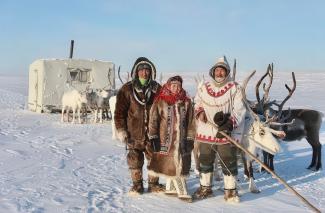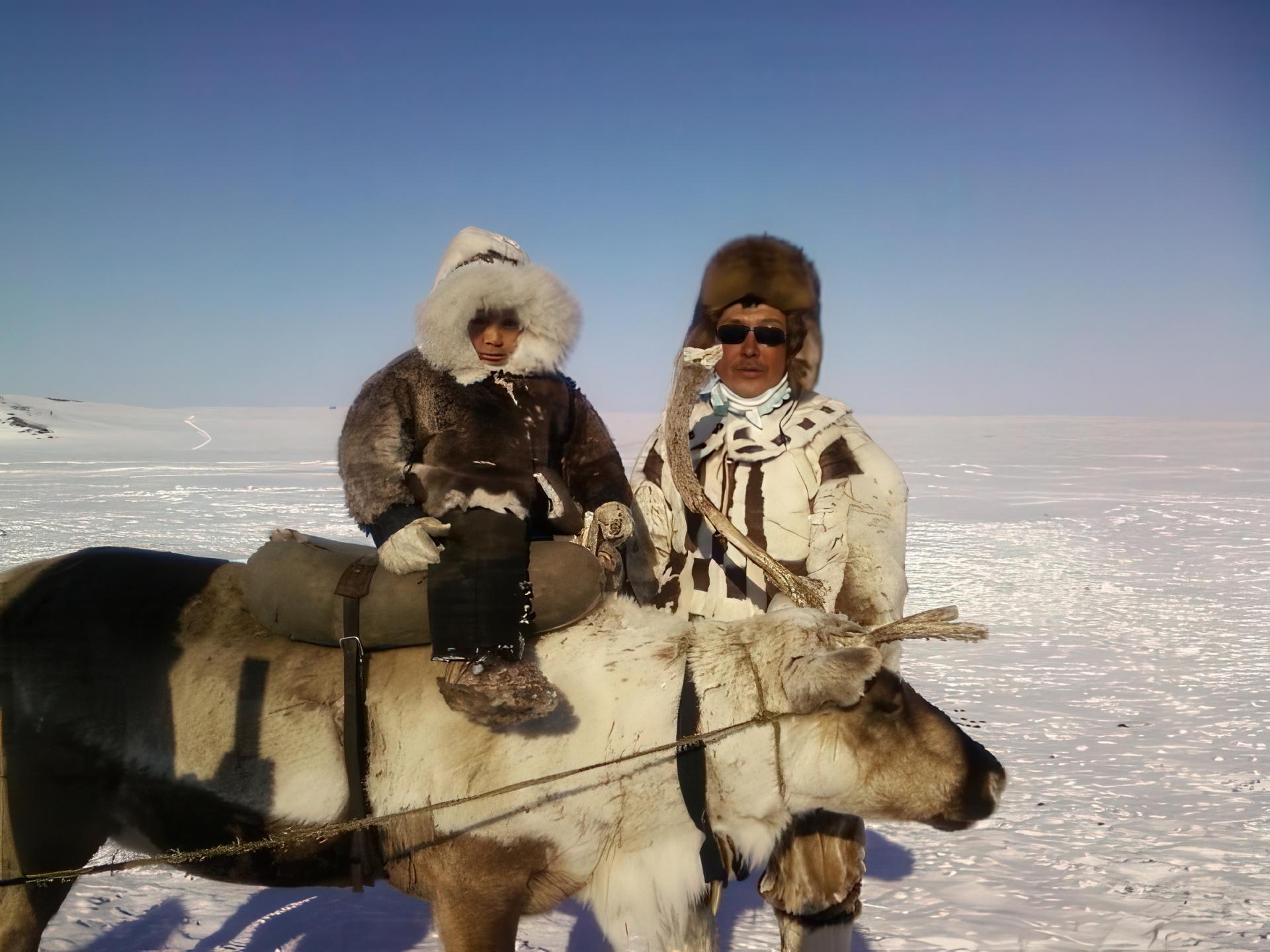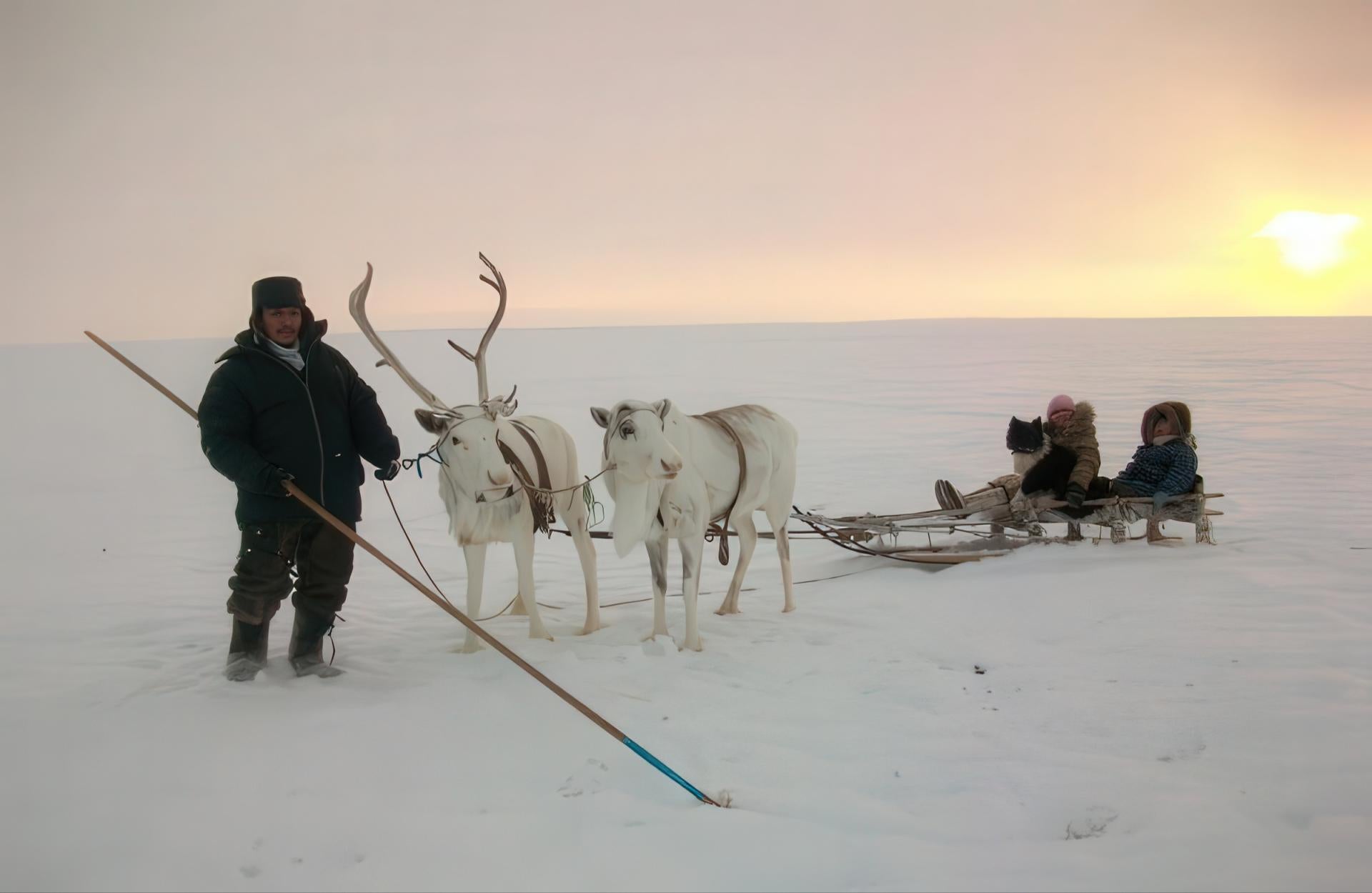
Kseniia Bolshakova (Dolgan) is an Indigenous language activist and decolonial writer from the Russian Arctic. In her writing in her native Dolgan language, she relives with her community, time and again, the piercingly familiar trials experienced by Indigenous Peoples around the world. The clash between traditional lifeways and colonial modernity, as well as the impacts of climate change, force Indigenous individuals to choose between safeguarding cultural identity and day-to-day survival. It is this acute, fleeting, and intangible moment that Bolshakova captures in her autofiction. The following is a chapter from All the Frost Melts. Bolshakova is a 2023 Cultural Survival Youth Fellow. To read more of her writing, find her on Instagram at @haka.huruksut.
A Split Second
By Kseniia Bolshakova (Dolgan)
I
Antlers flounder in the snow. The lasso digs into the body. Alyosha the herder is dragging Ksusha the reindeer fawn along the ground. I twist and buck. Scratched raw by the snow, my cheeks burn. Finally, I wriggle free and run to my antlers. My brother gathers up the lasso and starts chasing after me, whooping. He tosses the lasso toward me, but I dodge the loop. The reindeer watch with astonishment this little human fawn with heavy antlers, wearing a coat, hat, and boots all of reindeer skin.
The young men are getting ready to go ice fishing. We younger kids have begged to come along. For this occasion Grandpa has harnessed us his best lead reindeer from the family herd. Content, we head in for some tea.
We never drink “plain tea.” I lay a fried grayling out on a piece of newspaper and stuff my face with the tender white meat. A tiny fish spine pokes into my throat. I grab a piece of bread and swallow the soft white part along with the bone. They’ll figure it out in my stomach. That’s what Grandpa says when he’s dipping boiled reindeer meat into sweetened condensed milk.
The young men are leaving the camp with three reindeer teams. The four of us clamber onto our sledge. Our team driver Uybaan pokes the reindeer butts with his pole. But the lead reindeer is in a bad mood, he keeps taking off to the right and leading his partner back to the herd. We’re going in circles in one place. And this is the best lead reindeer! Uybaacha goes over to the reindeer team and tugs on the stubborn guy’s harness. It’s not clear what he’s so riled up about.
“Come here!” “Araaa! What’s this?” It wasn’t our lead reindeer! The guys switched him out while we were having tea. We yelled after the dirty thieves that they should give our reindeer back. But all we heard in response was brazen guffawing. Well, thank you very much! And who needs you anyway! We get to go to the ice-rink instead! True, we don’t actually have a rink, but on the far side of the baloks there’s a pond just right for ice skating.

Njuku Zharkov getting his son used to the saddle.
II
Our fab four is all kitted out. Alyosha has a shovel, Andreika and Uybaan have some thin plywood, and I have real mittens! Last year I had a fur coat with closed sleeves, no hand openings. Not even a separate thumb area. I was walking around like a fingerless little penguin. But now my sleeves are open on one side like a grown-up’s.
We mark out a square, and each of us takes a corner and starts clearing the rink. Making good use of my mittens, I quickly turn into a snowman. Spent, Alyosha collapses on the cleared half.
It’s time to test the ice. I tug up the ties on my fur boots. I wind the deerskin bands tightly around my ankles. The boots are sewn from reindeer shin skins. The upper parts have fur on the outside while the soles have fur on the inside. They can slide along better than any skates.
Andreika gets a running start and slides off on the fur knees of his extra-tall fur boots. Uybaacha, belly down on a piece of plywood, crashes his head into the snowy sides of the rink. We fall all over each other, laughing.
The neighbors turn on their generator. The smell of gas calls us back to the camp. Aunt Tatyy plugs the DVD player into the TV. “Strong tea, my dearest tea,” I sing, filling up the mugs.
We are transported into a different life. It doesn’t matter that we know the movie by heart already. Over the course of two hours we race around in cars, climb to the top of a skyscraper, get lost in a sea of people and lights. And then it’s time to come back from that incredible world to our home. Where all we have is snow.
The gusty wind pushes me along insistently. The vortex whirls the snow up around the dogs, curled up into little balls. The reindeer, huddled close together, get covered in snowdrifts. The heavy pitch dark of the tundra bears down on our tiny camp. I find refuge from the darkness and cold in our small but sturdy balok.

III
What has become of my friends and my people now? Modern life has changed the Dolgans’ values and needs. The labor of the reindeer herders has been devalued. And few people are now willing to suffer the travails of tundra living for a mere pittance. The young people either go on living in the village, where they have houses, electricity, shops, at least some internet connection, or they take off for the city. They spend their lives doing senseless work that requires no skills or knowledge, just eats away their strength and the years of their lives.
Young Dolgans live the life of ordinary Russians, in apartment buildings, far from their families and Tribes- people, our native tongue, and tundra. Do they still feel like Dolgans? Are they raising their children as Dolgans? And who is to blame for this?
Snowmobiles that have replaced the reindeer. The dismantling of the collective farms and divvying up of reindeer shares in the ‘90s. Or, actually, the creation of the collective farms. Collectivization, Sovietization, Russification. Alcoholicification. Or maybe it goes even deeper.
Maybe the people to blame are not those who tried to build our life for us: carting our children off to boarding schools, creating reindeer herding brigades instead of family-based nomadic practices, enforcing game and fish quotas on our natural riches.
Maybe the guilty ones are those who baptized us left and right, denigrated our faith in the protector spirits, skinned us for pelts, and Siberia’s other “gifts.” How else did we end up as wandering aliens on our own land, as minorities dependent on state welfare?
My home village of Popigai stands by the river of the same name, which leads to the Popigai crater. This “star wound,” opened by a crashed meteorite, gushed out a rain of diamonds. But the rain anointed the heads not of Dolgans, but of the industrialists divvying up the entrails of our earth. We live in poverty and debt. The only difference is that earlier the debt books were held by merchants, and now what’s owed for groceries is jotted down in debt registers by village shop owners.
The one thing the Dolgans still have is reindeer. Reindeer herding died out for the Upper Dolgans back in the ‘70s. The Lower Dolgans are selling their herds to reindeer herders in the neighboring Anabar ulus in Sakha Republic, or just killing their reindeer for meat. Do we have a future? Or just a fleeting present and a past melting in the tundra distance?
English translation by Ainsley E. Morse.
All photos by Kseniia Bolshakova.
